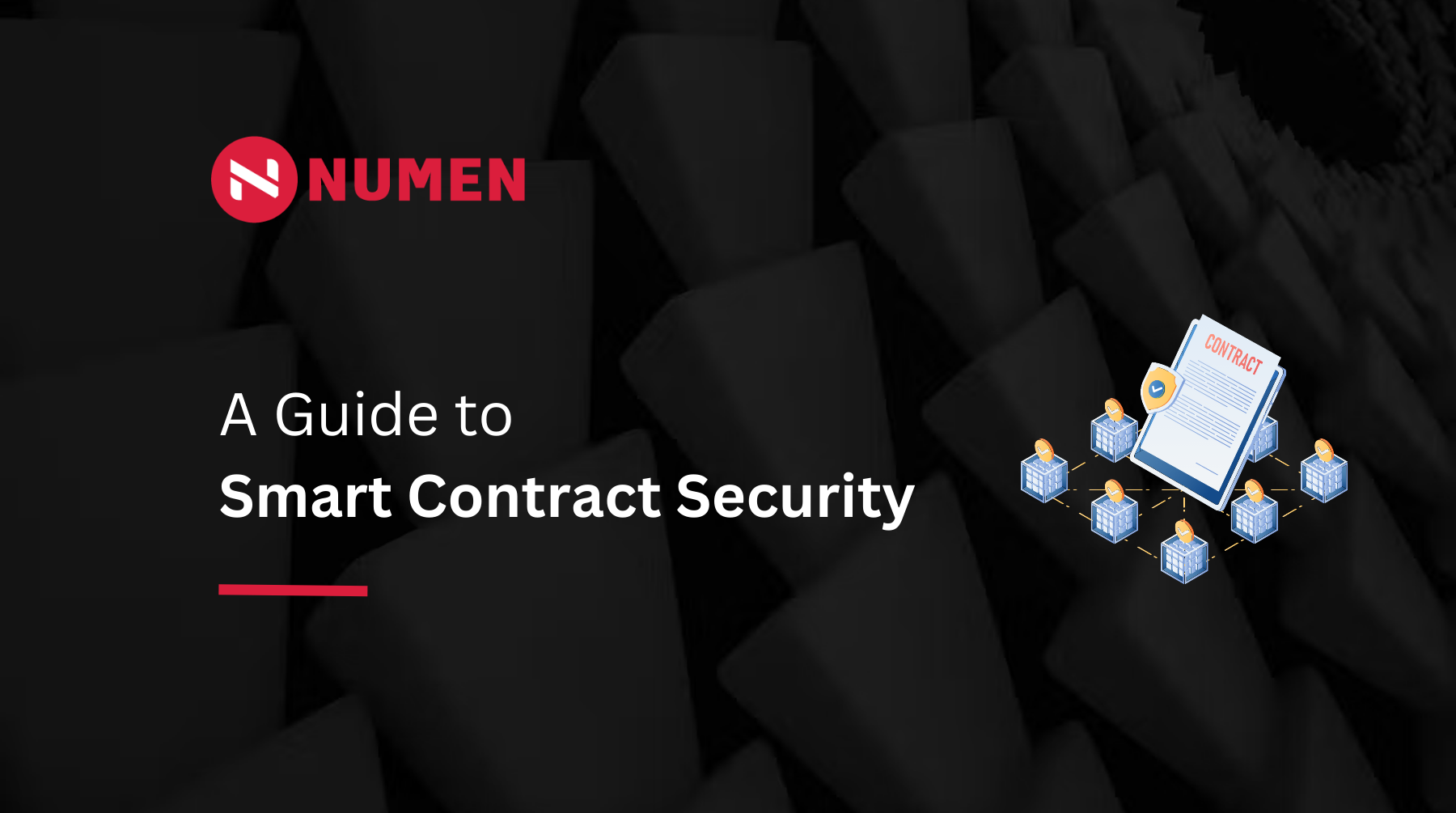
Web3 adoption is skyrocketing, with smart contracts at the forefront of this transformative technology. These self-executing contracts have opened up endless possibilities, from decentralized finance to supply chain management and beyond. As the blockchain landscape expands, the need for robust smart contract security becomes increasingly vital.
In this comprehensive guide, we delve into the intricacies of smart contract security, equipping developers and users with the knowledge and tools they need to safeguard their assets and ensure the integrity of their transactions.
The Importance of Smart Contract Security
Smart contracts have emerged as a groundbreaking technology, revolutionizing various industries and fueling the growth of decentralized finance (DeFi) protocols. However, this progress has come at a cost, as 2022 witnessed a staggering $3.8 billion stolen from cryptocurrency businesses through hacking activities. With such alarming figures, it becomes clear why smart contract security is of paramount importance.
DeFi protocols have become the primary targets for hackers, accounting for a significant 82.1% of all cryptocurrency stolen in 2022, totaling $3.1 billion. Exploiting vulnerabilities in these smart contracts has become an enticing prospect for malicious actors, making the need for enhanced security measures all the more critical.
To address these security concerns, the implementation of rigorous smart contract audits becomes crucial. Third-party auditing providers, such as Numen Cyber, have demonstrated success in identifying and mitigating vulnerabilities. However, the onus lies not only on auditors but also on DeFi developers themselves through the adopting of best practices.
Understanding Smart Contract Security
Let’s explore the fundamental concepts of smart contract security and provide insights into its principles and offering actionable best practices to mitigate risks and ensure the integrity of smart contract systems.
Smart Contract Principles and Best Practices
Smart contract security encompasses the principles and practices employed by developers, users, and platforms to safeguard smart contracts from vulnerabilities and malicious attacks.
Principle 1: Code Quality and Robustness
The quality and robustness of smart contract code are fundamental to its security. Developers must adhere to rigorous coding standards and best practices to minimize the potential for bugs and vulnerabilities.
Principle 2: Secure Design and Architecture
A secure design and architecture are essential to mitigate potential risks. Developers should follow secure architectural patterns and employ well-established security frameworks to ensure the resilience and integrity of smart contracts.
Principle 3: Thorough Testing and Auditing
Comprehensive testing and auditing play a vital role in smart contract security. Developers should conduct thorough unit testing, integration testing, and simulated attack scenarios to identify and address vulnerabilities before deployment. External security audits by reputable third-party firms can provide an additional layer of scrutiny, helping to uncover potential weaknesses and ensure the overall robustness of the smart contract code.
Numen Cyber provides cutting-edge smart contract auditing services that are unmatched in the industry. We understand the critical importance of having secure code free from any potential exploitable vulnerabilities. With our expertise, we can thoroughly assess and analyze your code to identify and address any weaknesses, offering you peace of mind and protection. Don’t hesitate to reach out to us.
Principle 4: Continuous Monitoring and Response
Smart contracts should be continuously monitored to detect and respond promptly to any suspicious activities or anomalies. Monitoring tools and mechanisms can help identify unauthorized access attempts, unusual transaction patterns, or potential exploits.
Numen’s soon-to-be-released flagship product, ImmunX, will allow for real-time monitoring and features attack-blocking & interception capabilities.
Principle 5: Regular Updating and Patching
Smart contract security is an ongoing process that requires regular updates and patching. As new vulnerabilities and attack vectors emerge, developers must stay informed about the latest security practices and promptly address any identified weaknesses.
Keeping smart contract systems up to date with the latest security patches and enhancements is crucial to maintaining their integrity and resilience.
Best Practices for Smart Contract Security
In addition to the principles outlined above, there are several best practices that developers should adopt to enhance smart contract security. These include:
- Implementing multi-factor authentication and secure key management practices.
- Employing secure development frameworks and libraries.
- Conducting regular security training and awareness programs for developers.
- Implementing proper access controls and permission management.
- Encrypting sensitive data and employing secure communication protocols.
- Regularly backing up smart contract data and maintaining secure backup storage.
Proactive Measures for Smart Contract Security
While adopting best practices and adhering to the principles of Smart Contract can mitigate risks, there are other proactive measures developers can take to proactively identify vulnerabilities.
The Role of Audits
Smart contract audits are vital for safeguarding the integrity, reliability, and trustworthiness of contracts, effectively mitigating the risk of substantial financial losses and potential harm to one’s reputation. By subjecting contracts to rigorous examination, these audits bolster confidence in their functionality and security, thereby fostering a safe and dependable ecosystem for all stakeholders involved.
Identifying Vulnerabilities and Strengthening Security
Smart contract audits serve as a comprehensive evaluation process, meticulously scrutinizing the codebase to identify potential vulnerabilities and weaknesses. Through rigorous testing, auditors such as Numen Cyber employ various methodologies to uncover security flaws, logic errors, or susceptibility to malicious attacks. Detecting these vulnerabilities early on is extremely important in preventing any potential financial losses and reputational damage.
Enhanced Trust and Confidence
The reputation of a smart contract and its underlying blockchain ecosystem heavily relies on the trust and confidence of its users. Smart contract audits play a crucial role in building and maintaining this trust. Through these audits, developers can demonstrate their commitment to security and transparency. The assurance provided by a thorough audit instills confidence in users, investors, and other stakeholders, which can lead to wider adoption and increased trust in the system.
Regulatory Compliance and Industry Standards
With the increasing focus on blockchain regulations, smart contract audits are becoming a necessary step for compliance with industry standards and regulatory frameworks. Audits help ensure that smart contracts adhere to specific guidelines and security standards set by regulatory bodies.
Continuous Monitoring and Bug Bounty Programs
In this section, we will explore the importance of continuous monitoring and bug bounty programs in strengthening the security of smart contracts post-deployment.
The Need for Continuous Monitoring
Smart contracts, once deployed, become part of a dynamic and interconnected ecosystem. Developers should always continuously monitor their behavior and security posture to identify potential risks and vulnerabilities. Continuous monitoring involves actively monitoring the execution of smart contracts, analyzing transactions, and assessing the integrity of the underlying blockchain infrastructure.
Bug Bounty Programs: Harnessing Community Expertise
Bug bounty programs have emerged as a powerful mechanism to harness the collective expertise of the security community in identifying and reporting vulnerabilities in smart contracts. By incentivizing ethical hackers and researchers to discover and responsibly disclose security flaws, bug bounty programs create a collaborative and proactive approach to security.
Developers can set up bug bounty programs that offer rewards to individuals who uncover critical vulnerabilities, encouraging the community to actively contribute to the improvement of smart contract security.
Rate Limiting
Rate Limiting refers to the practice of restricting the number of requests or operations that can be made within a certain time frame. It also helps prevent abuse, unauthorized access, and resource exhaustion attacks by imposing limits on the frequency or volume of interactions with the smart contract.
Implementing rate limiting mechanisms in smart contracts can provide several benefits for security:
Protection against DoS Attacks
By setting limits on the rate of incoming requests or operations, rate limiting helps mitigate the risk of denial-of-service (DoS) attacks. Attackers attempting to overwhelm the contract with a high volume of transactions or resource-intensive operations will be restricted by the rate limit, preventing the contract from being overwhelmed and ensuring its availability for legitimate users.
Preventing Unauthorized Usage
Rate limiting can help control and prevent unauthorized or abusive usage of the smart contract by enforcing limits on the frequency or volume of interactions.
Managing Resource Consumption
Smart contracts operate within resource constraints, such as gas limits in Ethereum. Rate limiting can help manage and optimize the utilization of these resources by preventing excessive or inefficient usage.
Enhancing Security and Stability
Rate limiting can contribute to the overall security and stability of the smart contract ecosystem. By controlling the rate at which operations are processed, potential vulnerabilities or bugs can be identified and addressed in a controlled manner. This allows developers to detect and respond to potential threats or issues before they escalate.
Smart Contract Security Risks
Introduction: Smart contracts, while offering numerous benefits and opportunities, are not immune to security risks. The inherent complexity of smart contract programming and the potential for exploitable vulnerabilities create a need for proactive measures to mitigate these risks. Here are some of the most common smart contract vulnerabilities.Unchecked Call Return Values
Reentrancy Attack
Smart contracts are vulnerable to reentrancy attacks when they do not properly manage the order of state changes during the execution of external function calls. Exploiting this vulnerability, attackers can repeatedly enter and exit the contract within a single transaction, maintaining the contract in a specific state and illicitly siphoning off assets.
Integer Overflow
Integer Overflow: An integer overflow happens when a variable surpasses the maximum value that can be represented by its data type during arithmetic operations. This results in the value wrapping back to the minimum value or exceeding the maximum value, leading to inaccurate outcomes.
Function Visibility Vulnerability
There are two types of vulnerabilities associated with function visibility. The first type occurs when functions that should not be publicly accessible are mistakenly marked as public, thereby enabling anyone to invoke them. This can lead to unauthorized access and misuse of sensitive functionality.
The second type arises when a function is marked as private when it should have broader visibility. This can disrupt normal functionality and potentially introduce security issues if essential operations are inadvertently hidden from other contract components or external interactions.
Unchecked Call Return Values
ailing to validate the return values of message calls can introduce vulnerabilities. Even if the called contract throws an exception, the execution will proceed. This lack of validation leaves the contract exposed to unexpected behavior. If a call fails unexpectedly or if an attacker intentionally forces a call to fail, it can have adverse effects on the subsequent program logic.
Final Thoughts
As the adoption of decentralized applications and the utilization of smart contracts continue to expand, understanding and addressing security risks becomes crucial to safeguarding valuable assets, maintaining trust, and ensuring the integrity of blockchain ecosystems.
The collaboration between developers, auditors, and the wider community plays a critical role in identifying and addressing vulnerabilities, ultimately contributing to the resilience and trustworthiness of smart contract-based systems.
We must recognize that smart contract security is an ongoing and iterative process. It requires continuous monitoring, regular updates, and the adoption of emerging best practices to adapt to the ever-changing threat landscape.
To stay abreast of the latest attacks in the DeFi space, you may follow our Twitter @numencyber or our alerts account @numenalert.
Should you require additional assistance with the security of your smart contracts, feel free to contact us and we will help ensure that your contracts are free of vulnerabilities and exploits.


